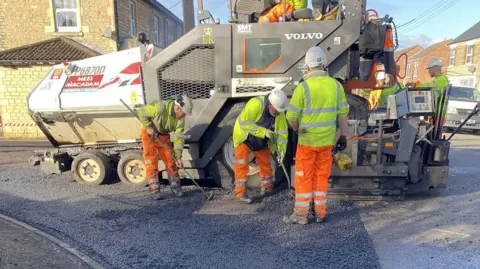Road was resurfaced while 'meeting net zero' terms
 Wiltshire Council
Wiltshire CouncilA street dubbed the "worst road" in a town has become one of the first in the UK to be resurfaced while meeting net zero standards, according to a council.
Ladyfield Road in Chippenham was resurfaced in October, after residents' vehicles suffered damage and discomfort by cracks and potholes.
Now, it has come to light that the work was part of a trial between Wiltshire Council contractors and academics to product a "net zero" road surface.
Using biochar, a waste product from the biomass industry, Wiltshire Council said the process had increased the cost of the project by 5%.
According to the Local Democracy Reporting Service (LDRS), the process included superheating straw waste, used to power boilers to heat industrial greenhouse, in a vacuum, locking in carbon rather than releasing it into the atmosphere.
Biochar makes up about 7% of the road surface material.
The contractors also used UK-produced steel slag, a by-product of the steel industry, rather than virgin material.
The top of the new road surface material was Milepave, which is produced at lower mixing temperatures than traditional Tarmac, requiring less energy and bitumen, and which is derived from crude oil, according to LDRS.
The scheme used 871 tonnes of Milepave across 8,216 sq m (about two acres) of road surface, cutting carbon by 40%, equivalent to the carbon emissions of 10,000 litres of diesel, the LDRS said.
The road was later sealed with a special asphalt grout that stops water getting into the road surface – making cracks and potholes far less likely.
Researchers at Aston University in Birmingham are are trialling the new road surface.
Follow BBC Wiltshire on Facebook, X and Instagram. Send your story ideas to us on email or via WhatsApp on 0800 313 4630.
